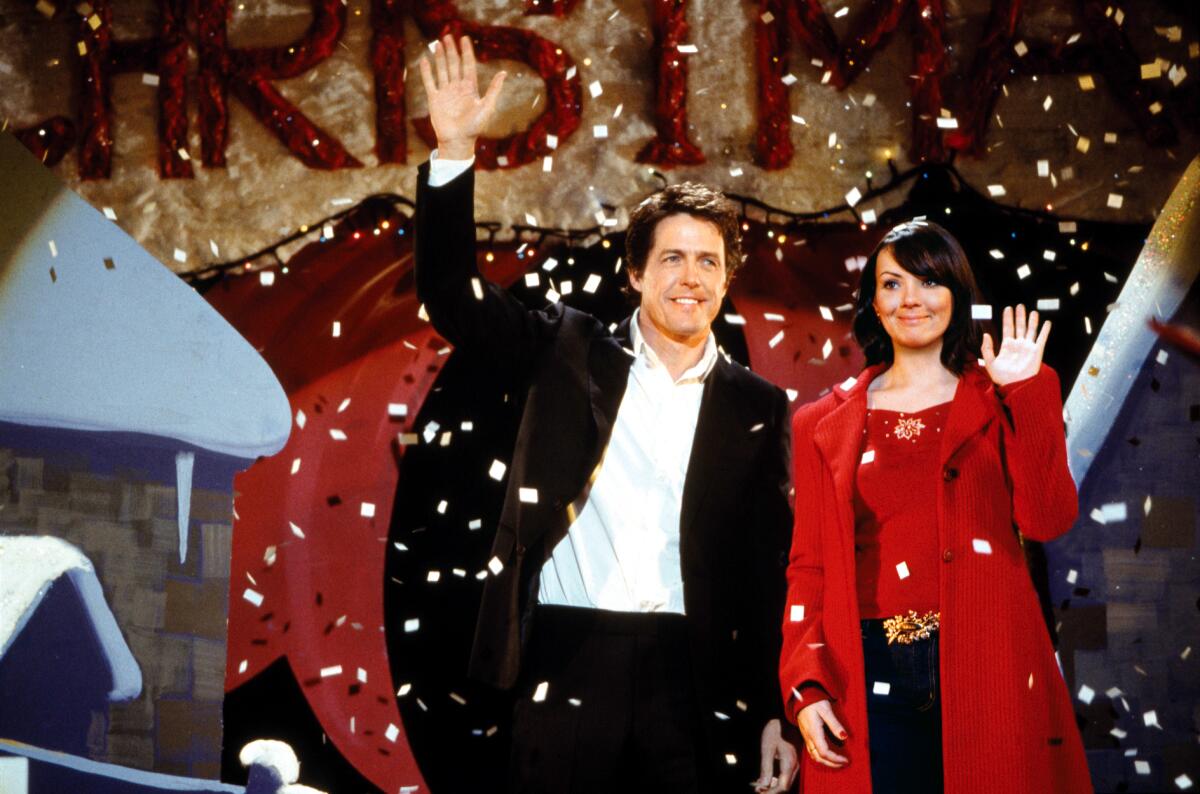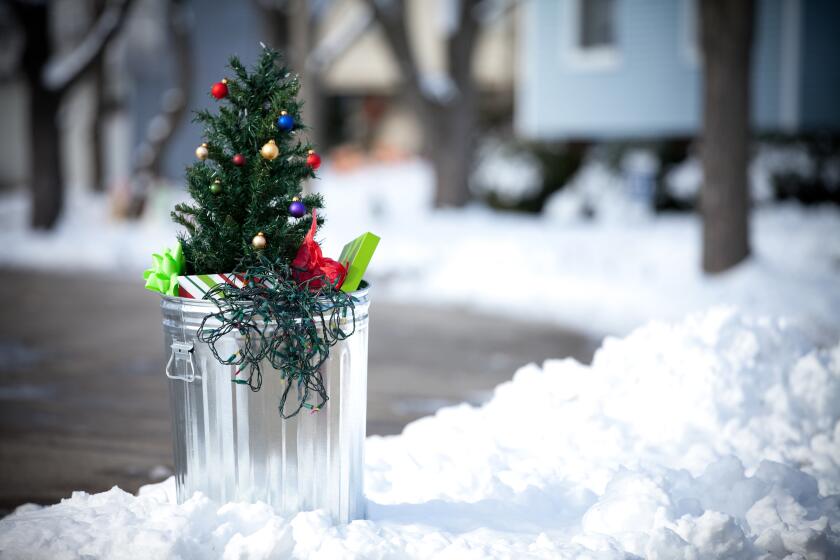Column: ‘Love Actually’ is like fruitcake: Love it or hate it (and I choose love), it’s here to stay

- Share via
It’s that most wonderful time of the year again, when, a full month early, Michael Bublé breathes holiday tunes down the neck of every supermarket shopper, the local Christmas tree lot springs from the mulch of the local pumpkin patch and people start getting very heated about “Love Actually.”
For some, Richard Curtis’ sweet 2003 rom-com collage is as sacrosanct a piece of Christmas canon as “It’s a Wonderful Life,” “A Christmas Story” or “Elf.” Memes and TikTok renditions of the film’s iconic moments abound. In 2017, a 17-minute sequel helped raise millions for “Red Nose Day”; a year later, “Love Actually Live” began its annual holiday run.
On Tuesday, Diane Sawyer hosted a special called “The Laughter & Secrets of ‘Love Actually’ 20 Years Later,” in which we discovered, among other things, that notoriously grumpy Hugh Grant did not want to do the memorable dance number and Bill Nighy’s casting as the aging rocker, Billy Mack, was a happy accident.
For others, however, “Love Actually” represents all that is wrong with Christmas, cinema, Britain and, quite possibly, humanity itself. Over the years, Grinchy critics have expressed bafflement and/or outrage over the film’s enduring popularity. It has been called out for the whiteness of its cast, the welter of its plots, the shallowness of its characters and the fact that so many of the relationships involve men in power and the women who work for them.
In 2018, Stephen Marche wrote an essay that appeared to blame “Love Actually” for Brexit.
Such intense and often hyperbolic criticism proves the film’s place in the culture even more definitively than the praise, though the praise grows more lavish with each passing year. Who would have thought that a movie that got only fair to middling reviews when it premiered would wind up with a live musical experience and a Diane Sawyer special?
I remember seeing “Love Actually” on a double date to the cineplex, mostly because my husband surrendered to majority rule despite having already seen the film twice. (He was, I believe, writing a profile of Curtis.)
It’s possible that someone could respond with complete indifference to the news of a holiday production called “Love Actually Live,” opening Wednesday in Beverly Hills.
For a man who is not a huge fan of rom-coms and who, until “A Very British Scandal,” actively avoided anything starring Hugh Grant, this was as sincere an act of love as any spouse could hope for, which only proved the film’s point: Love actually is all around us.
I don’t remember exactly when “Love Actually” officially joined the holiday canon, though I do remember discussing it with Curtis myself in 2011 (when “War Horse” debuted), and he was pleasantly surprised.
But ours is now a loyal “Love Actually” family and has been for years. It is the first film my eldest daughter and I watch when we commandeer the living room to wrap Christmas presents; then we watch it again with the rest of the family.
While I was glancing at the opening scenes in preparation for this column, both my daughters expressed indignation — “Are you watching ‘Love Actually’ without us?”
Like it or not, “Love Actually” has become an essential seasonal ritual. And as with any seasonal ritual, from ugly sweater contests to arguments over canned versus homemade cranberry sauce, its emotional power has as much to do with personal or familial history as the film itself.
Repeat watching of any movie can excavate its flaws; I love “It’s a Wonderful Life,” but I hate how George Bailey’s decision to marry Donna Reed’s Mary automatically means giving up his dreams to remain stuck in Bedford Falls. (Why couldn’t they both do a little traveling?)
Even within the very elastic confines of its mini-portrait format, “Love Actually” has more than a few issues. As Curtis himself pointed out to Sawyer with some chagrin, three of the story lines portray men getting involved with women in very subordinate positions (two secretaries and a house cleaner). One, involving a British man traveling to America to seek sex because British women are so cold, plays like it was lifted from “Dear Penthouse” letters, while Billy Bob Thornton’s portrayal of a bullying, sexually predatory American president amounts to an act of war.
The holidays can be brutal for children of alcoholics, especially amid a pandemic that traps families at home. But on a scary, snowy night decades ago, the chaos of my mother’s drinking finally gave way to a real Christmas miracle.
But it doesn’t matter. At least not in our house. The film’s wide-ranging understanding of love in all its gloriously imperfect forms is exactly what the season calls for. We are all aware of how absurd and maddening some of it is — no thinking person would consider Martine McCutcheon’s Natalie chubby — but that doesn’t outweigh the pleasure of the moments we love.
Including: London at Christmas. The soundtrack. Every scene with Bill Nighy’s mischievous old rock star. Hugh Grant’s dancing prime minister. The Christmas lobster. Emma Thompson attempting to cheer up Liam Neeson. Emma Thompson waxing eloquent about Joni Mitchell. Emma Thompson breaking down after her Christmas Eve discovery. Emma Thompson’s “What would you do?” speech. OK, every scene with Emma Thompson.
Laura Linney telling her stricken brother she is “free as a bird.” Alan Rickman trying to buy a gold necklace while Rowan Atkinson makes it difficult. Keira Knightley
bringing Andrew Lincoln pies. Andrew Lincoln’s exquisite body language after he reveals his crush on Keira Knightley‘s character (forget the famous placard scene; this may be my favorite part).
Liam Neeson at his wife’s funeral. Colin Firth bumbling his adorable monolingual way through the burgeoning relationship with Lúcia Moniz’s Portuguese-speaking Aurelia — especially the scene in which he jumps in the pond and freaks out about eels.
Young Olivia Olson singing “All I Want for Christmas”; porn star stand-ins Martin Freeman and Joanna Page complaining about traffic and shyly falling in love; and, of course, McCutcheon’s famous line, “Where the f— is my f— coat?”
As you can see, it is a Homeric list. For all the story’s surrender to sentiment, the dialogue is witty and sharp, delivered by a ridiculously talented cast that goes on for days. Is Chiwetel Ejiofor wasted? Yes he is. Would more diversity have made the film better representative of modern Britain? Yes, as Curtis also admitted to Sawyer, it would.
Beware the allure of the clean slate. Sometimes forgetting past troubles helps us move forward, but sometimes it’s exactly what’s holding us back.
“Love Actually” was never going to land on any Top 100 all-time lists, but that is not the point. Like the holidays themselves, many films in the season’s canon are a bit messy, but we overlook the flaws because the good bits connect us and recall the happy moments of other years.
A few of these staples — “A Christmas Carol” with Alastair Sim; “It’s a Wonderful Life,” “Elf,” “Die Hard,” “Silver Linings Playbook” and the animated “How the Grinch Stole Christmas!” — are legitimate cinematic standouts. The rest endure because they do what we need them to do at the holidays — unite us on an emotional journey of laughter, tears, nostalgia, hope and, with any luck, a magical snowfall or two.
And, perhaps, give us something to argue about that doesn’t involve politics.
I don’t understand how anyone could hate “Love Actually,” but then I don’t understand how anyone can bring themselves to eat fruitcake or drink eggnog. The most beloved holiday rituals are almost always mystifying to those who do not share them.
So “Love Actually” haters can yell all they want, but the rest of us will still laugh, cry, quote and dance our way through every sublime and ridiculous moment. Because ritual is important and this is one of ours.
And I, for one, don’t think it had anything to do with Brexit.
More to Read
The biggest entertainment stories
Get our big stories about Hollywood, film, television, music, arts, culture and more right in your inbox as soon as they publish.
You may occasionally receive promotional content from the Los Angeles Times.













